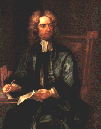
What was unique about Jonathan Swift's political position was that he considered himself a Whig but his religious policy Tory. During a time when religion and politics where so intertwined, that was a problematic course. What Swift was really opposed to was Whig ecclesiastical policy. His High Church work was extremist and in the end of Queen Anne's reign he became a Tory publicist, pamphleteering to defend the church from Whig ecclesiastical policy. Swift was also committed to a universally Anglican England and was opposed to intolerance, was hostile to Protestant immigration. This was not to say that he was always pro-English. His disgust over English policies in Ireland led him to write the biting and graphic Modest Proposal. Because Ireland was predominantly Roman Catholic, a Catholic King would directly affect that country and especially those like him, who were a religious minority. So Swift saw politics as Anglican vs. Papists and dissent (Higgins 21). "The Church of England Man thinks 'a man may observe every Article of the English Church, without being in too much pain about it (Higgins 9). "The Parties among us are made up one side, of moderate Whigs, and on the other, of Presbyterians and their Abettors; by which last I mean, such who can equally go to a Church, or a Conventicle; or such who are indifferent to all Religion in general, or lastly, such who affect to bear a personal Rancor towards clergy (Higgins 20).
Ireland was entirely Roman Catholic, with a militant Presbyterian minority. "I look on myself in the capacity of a clergyman, to be one appointed by Providence for defending a post assigned me, and for gaining over as many enemies as I can" (Higgins 21).
| Back to Home | Previous Page | Next Page |